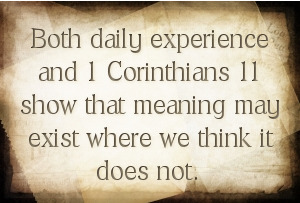Cultural Conservatism, Styles and Accidental Meaning

A river in China features a warning sign for visitors. Thoughtfully, the authorities included this helpful English translation: “Take the child. Fall into water carefully.”
It is possible to intend one meaning and yet convey a very different one! In other words, a medium (vehicle of meaning) may “contain” meaning we do not realize is there. And use of that medium may also send a message we do not realize is being sent.
This phenomenon has important implications for the debate over cultural conservatism (“styles” or “forms” of music, dress, speech, etc.) and the sub-debate over the fitness of styles of music for worship. Many involved in the debate seem to reason that since they do not intend any meaning by the style they are using, and they are not aware of any meaning, therefore no meaning exists and none is being conveyed. Are they right?
The case of Corinth
Before we turn our attention to the implications of accidental cultural meaning, we should pause and consider another question: does the Bible teach that styles have meaning—intended or otherwise? It does, and 1 Corinthians 11 contains an example. In this passage, not only does a medium convey meaning, but the meaning conveyed is not what some of those involved intended.

 I have friends who believe in baptizing infants. We remain friends even though we both believe that (a) getting baptism right is important and that (b) the other guy is just plain wrong. Though we disagree about a matter that is weighty to both of us, we get along just fine.
I have friends who believe in baptizing infants. We remain friends even though we both believe that (a) getting baptism right is important and that (b) the other guy is just plain wrong. Though we disagree about a matter that is weighty to both of us, we get along just fine.

Discussion